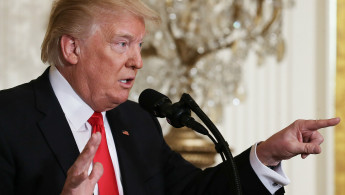Trump demands Gulf states pay for Syria 'safe zones'
US President Donald Trump has pledged to make Gulf countries pay for a Syrian "safe zone", which would keep refugees inside the war-torn country.
Trump, speaking at a campaign rally in Florida over the weekend, said oil-rich Arab countries would foot the bill for the long proposed safe havens for civilians.
"What I want to do is build safe zones in Syria and other places so [Syrians] can stay there and live safely," Trump said.
"We do owe $20 trillion. Okay. So we're going to have the Gulf states pay for those safe zones. They've got nothing, but money," he said.
"We're going to do it that way instead of taking massive numbers… we don't want people with bad, bad ideas," the US leader added.
Trump's demand that Gulf countries, such as Saudi Arabia and Qatar, pay for the zones echoes his calls for Mexico to pay for his plan to build a massive barrier between the countries.
Gulf states, which have been heavily involved in the conflict in Syria, have long been criticised for not taking their share of refugees to alleviate the ongoing crisis.
Last month, the US president declared that he would "absolutely do safe zones in Syria" without giving further details.
| Read also: Assad's continuing genocide must not be obscured by Trump |
He issued a controversial executive order which banned refugees in seven Muslim-majority countries from entering the US and dropped the plan to establish safe zones.
The White House then said Trump and Saudi King Salman discussed setting up safe zones in war-torn Syria and Yemen during a phone call last month.
"The president requested and the King agreed to support safe zones in Syria and Yemen, as well as supporting other ideas to help the many refugees who are displaced by the ongoing conflicts," a statement said.
Safe zones, proposed by both Trump and Democrat Hillary Clinton during the election campaign, were ruled out by the Obama administration.
Turkey has repeatedly called for a "safe zone" inside Syria supported by a no-fly zone, which it believes could help to alleviate the burden of accommodating Syrian refugees.
More than 310,000 people have been killed in Syria since the conflict began in March 2011 with anti-government protests against Bashar al-Assad's regime. The war has displaced over half the country's population and drawn in extremists and international militaries.





 Follow the Middle East's top stories in English at The New Arab on Google News
Follow the Middle East's top stories in English at The New Arab on Google News
![The UAE is widely suspected of arming the RSF militia [Getty]](/sites/default/files/styles/image_330x185/public/2024-11/GettyImages-472529908.jpg?h=69f2b9d0&itok=Yauw3YTG)
![Netanyahu furiously denounced the ICC [Getty]](/sites/default/files/styles/image_330x185/public/2024-11/GettyImages-2169352575.jpg?h=199d8c1f&itok=-vRiruf5)
![Both Hamas and the Palestinian Authority welcomed the ICC arrest warrants [Getty]](/sites/default/files/styles/image_330x185/public/2024-11/GettyImages-2178351173.jpg?h=199d8c1f&itok=TV858iVg)